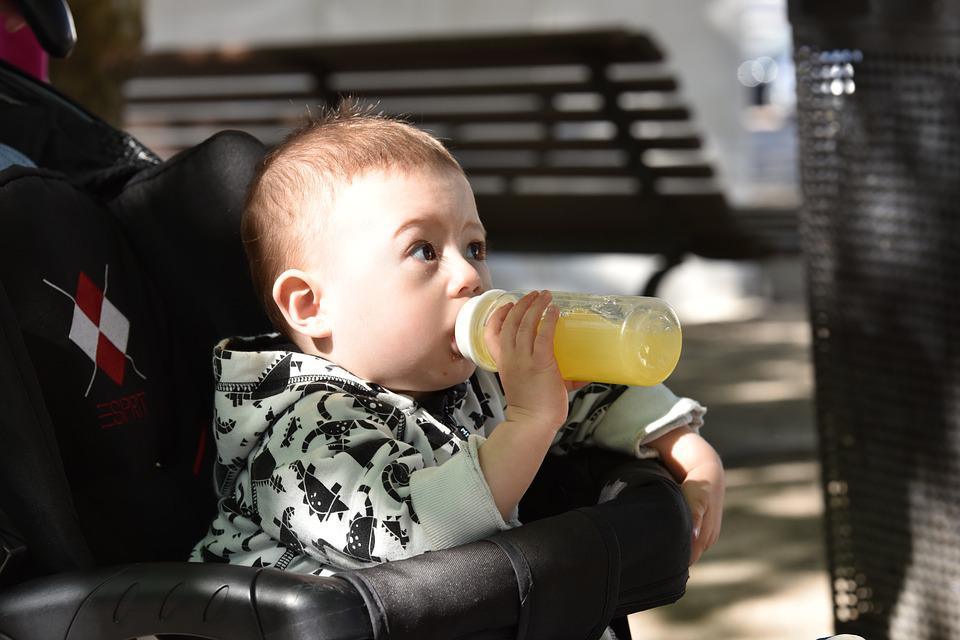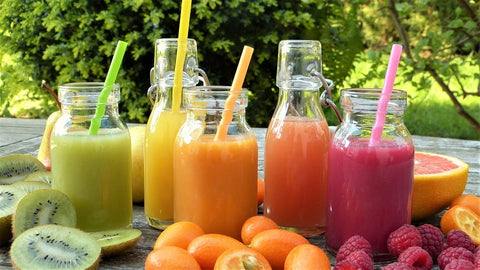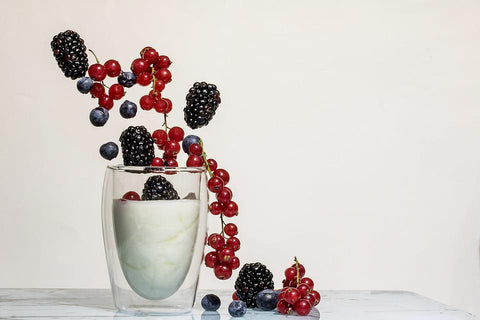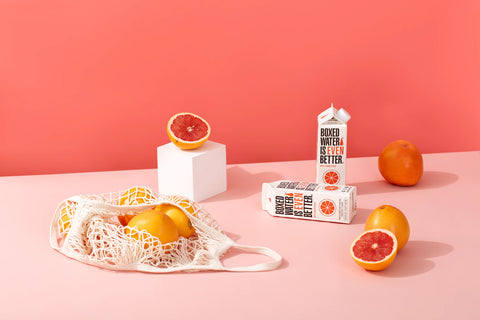Five Tips for Offering Juice to Babies
•Posted on August 23 2022

Into the autumn and winter season, the climate is dry, to the baby timely replenishment of water into a necessary work. But the bland and tasteless drinking water do not like to drink, other fruit-flavored drinks and too many additives. So, parents have turned their attention to both healthy and delicious - pure fresh juice!
A part of the parents will not love to drink water because of the baby, and diluted juice to help the baby drink more water. This, although the purpose of increasing water intake, but the child lazy to eat fruit, and will inadvertently increase the intake of sugar, increase the "overweight" hidden danger, interference with the intake of other nutrients.
Can babies drink fruit juice? What do you need to know about providing juice to babies? We have researched and compiled a baby juice report for you. After reading this article, you can answer all your questions about baby juice.
Table of Content:
- Juice vs. Eating fruit
- Can babies drink fruit juice?
- Six hazards of juice intake in babies and children
- Baby drink juice considerations: Five tips for offering juice to babies
- How to choose juice for babies?

Juice vs. Eating fruit
There is a very big difference between drinking juice and eating fruit. When your baby has teeth, we prefer to give your baby fresh fruit and as little juice as possible (even freshly squeezed juice from your own home without additives). Why is that? Take a look at the reasons:
1. Juice destroys nutrients
When fruit is juiced, almost all of the nutrients in the fruit, such as dietary fiber, vitamins and minerals, are destroyed. Only sugar and a small amount of water-soluble nutrients are in the juice. Most of the pectin, dietary fiber, calcium, iron and other minerals, which are not easily soluble in water, are left in the residue.
Moreover, either type of juicer inevitably results in a significant loss of vitamin C and antioxidants from the fruit. Compared with fresh fruits, juices do not have an advantage in terms of nutrition.
2. Juice is sweet and strong with high sugar content
When fruit is juiced, it contains very little nutrients but a lot of sugar. Juice contains almost all the sugar and calories in the fruit, and the sweetness is even stronger. It may cause your baby to be obsessed with sweetness, and it is easy to drink a large glass of sweet juice, resulting in too many calories,, not loving plain water, and laying hidden dangers for tooth decay.
3. Juice consumes more calories
Juice is easy to drink because it is tart and tasty, and it is easier to drink a lot of it if you are not careful compared to eating fruit. It is not very easy for a baby to eat an orange alone, but it is very easy for a baby to drink a glass of orange juice (2-3 oranges freshly squeezed). Compared to eating fruit, it is easier to gain weight by drinking juice.
As fruit juices are too high in sugar, thus also consuming more calories. From a young age, babies like to drink sweet fruit juices, which can lead to the baby also willing to drink only sweet drinks when they grow up, which brings the hidden danger of overweight and obesity in the future.
Can babies drink fruit juice?
The American Academy of Pediatrics gives the following recommendations:
- Infants within six months should be exclusively breastfed or fed infant formula, and juice is not recommended up to one year of age
- Up to 4 ounces per day for ages 1 to 3 years.
- No more than 4 to 6 ounces per day for ages 4 to 6 years.
- Older children and adolescents should drink no more than 8 ounces per day.
The "juice" refers to 100% sterilized pure juice and not your own freshly squeezed juice, and those with added flavors, colors, syrups, etc. are not recommended at all.
Juice has no nutritional value for babies under the age of 1 and increases the risk of obesity and dental caries, so it should not be included in a baby's diet. Even children over the age of 1 should strictly control their intake of fruit juices and be wary of bacterial infections that may be caused by unpasteurized freshly squeezed juices.

Six hazards of juice intake in babies and children
1. Obesity: squeeze into a cup of orange juice then need 3, 4 oranges, drinking juice will let the baby intake too much sugar and calories, easy to lead to obesity.
2. Tooth decay: the sugar content of pure fruit juice is about 8% to 16%, teeth contact with sugary liquid, it may cause tooth decay.
3. Dependence on sugar: the more your baby likes juice, the more it will resist plain water and all foods that taste light. In the long run, it is not good for the baby's growth and development.
4. Lack of chewing exercise: because the juice in the fiber less, so the baby basically do not need to chew, will make the baby develop a lack of chewing skills and like to swallow the eating habits.
5. Trigger gastrointestinal discomfort: because the gut of infants and toddlers under 1 year old is still relatively fragile, and can not be well absorbed fruit acids, sorbitol and other ingredients in fruit juice, poor absorption can easily lead to gastrointestinal discomfort. In addition, diarrhea or dehydration, do not let the baby drink juice, so as not to aggravate the symptoms.
6. Prone to malnutrition: high calorie juice will reduce the baby's appetite, affecting the intake of staple foods, thus potentially leading to nutritional imbalance of the baby.
Baby drink juice considerations
So, children under the age of 1, not a drop of juice can not be dipped? It is not so. Juice can be offered appropriately to babies in these situations:
- For treatment needs, children under 1 year old can drink some juice
- If your baby has constipation, you can use some juices to assist, such as prune and pear juice
- When a child before 1 year old has a cough, some apple juice will be suggested
Five tips for offering juice to babies
1. Choose pasteurized pure juice
Make sure the juice is 100% sterilized pure juice and limited consumption, do not give your baby to drink blended fruit drinks, and avoid buying commercially available juice products that have not been sterilized.
2. Do not drink a lot of juice
Drinking too much juice at one time may lead to osmotic diarrhea in babies.
3. Only drink from a cup and not drink juice before bedtime
Drinking juice from milk bottle or straw cup will increase the chance of contact between teeth and sugar and make you more likely to get cavities.
Drinking juice before going to bed will also have the risk of tooth decay.
4. Don't feed medicine with juice
Some parents use juice to lure baby to take medicine in order for baby to take medicine smoothly. The juice of some fruits contains flavonoids, which may reduce the utilization and medicinal properties of some drugs. For example, grapefruit juice may interfere with the absorption of some medications or have adverse effects.
5. Children with chronic diarrhea, intestinal gas, abdominal pain, bloating and other conditions, drink juice to follow medical advice. Also note that certain juices containing acid substances may cause skin allergy symptoms in babies.

How to choose juice for babies?
There are many baby products on the market, whether it's baby's clothing or the baby juice we're talking about today, it's dazzling. There are different kinds of juice products, there are 100% pure juice, there are full juice drinks, syrup juice, drink juice, fruit juice drinks and so on. In the end, which one is healthy, which one is not healthy, how should parents choose for their children?
The most important thing is to pay attention to the ingredient list and nutrients of the food or drink you buy in the market.
1. Full juice drinks
Generally is the original juice squeezed out of the fruit slightly diluted or adjusted with sugar and other processing of the juice, sometimes also add color, flavor and preservatives, etc.. This type of juice labeled 100% fruit juice is mostly used to concentrate juice and water recovery to the concentration of the original juice, after instant autoclaving treatment. Some dilution times more, the juice content varies.
2. Syrup juice
Syrup juice is generally the original juice or juice concentrate diluted with water, plus a large amount of sugar and food additives blended from. This juice contains high sugar content, not recommended for children to drink directly, need to dilute or blend other drinks.
3. Fruit juice soda
Although this drink also adds fruit juice concentrate, but the original juice content is very small, usually <10%. In addition, in order to ensure the taste, often add sugar and food additives blended from.
4. Freshly squeezed juice
Freshly squeezed juice purchased in stores is probably a gimmick! In physical beverage stores, few people really use pure juice to make juice drinks: one is the high cost; the second is that the color of freshly squeezed juice is darker, and after a period of time, it is easy to become brown and stratified, and if it is not properly preserved, it is likely to affect sales because of weather problems and quality discounts. We see the freshly squeezed juice is generally made with concentrated juice, sugar, flavoring and other blended.
In general, juice products bring less benefits to children. It is far better to choose fresh fruits than fruit juices.
Comments
0 Comments
Leave a Comment